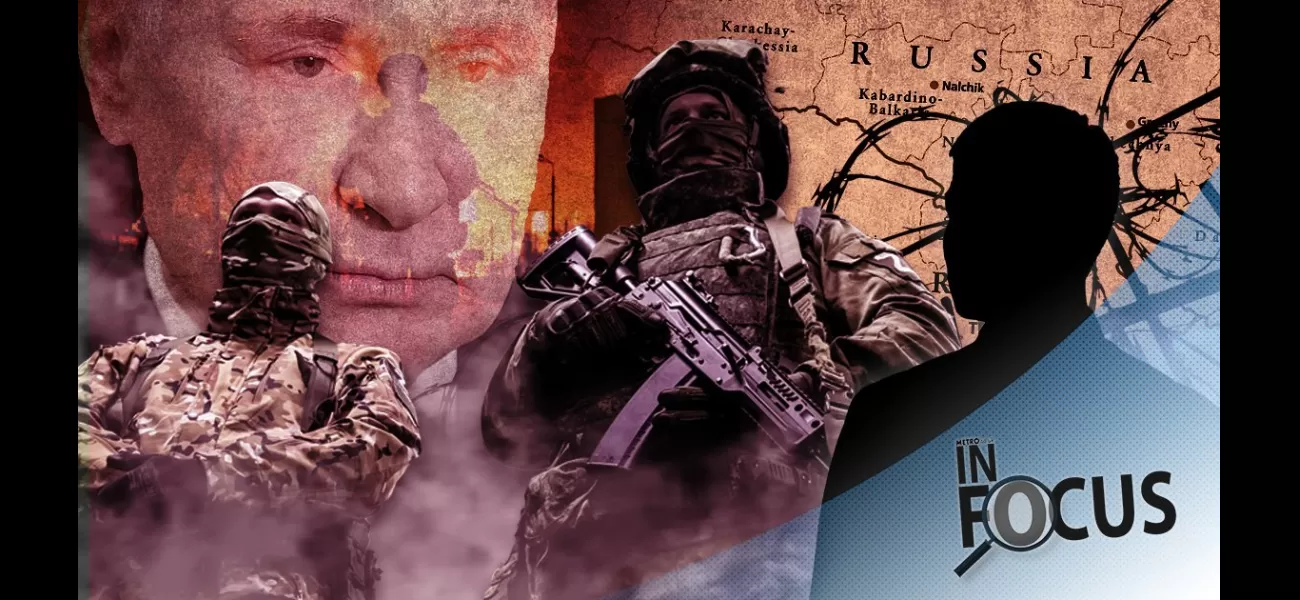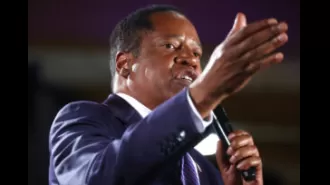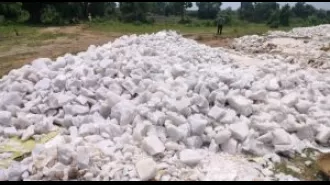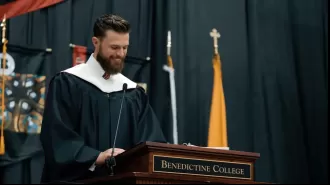Russians risking their lives for safety from war, facing tremendous hardship.
Man fled Russia to avoid going to war; Metro.co.uk spoke to him in Georgia.
January 6th 2024.

Yaroslav, a 23-year-old from the Moscow suburbs, is like many other Russians his age - he is fleeing conscription. With no visa needed to enter or work in Georgia, it has become a logical stop for those seeking refuge.
Sitting in Tbilisi's Shavi Lomi restaurant, slurping on chicken soup, Yaroslav is nervous. It's like Vladimir Putin is still breathing down his neck. Before his daring escape from his homeland, Yaroslav had been living a quiet life with his mum and sister, working at an antique bookshop.
But in Russia, university students were taken from classes and dormitories, mosques were raided, and young men eligible for military service were dragged to enlistment offices. With Putin's war on Ukraine progressing, hundreds of thousands like Yaroslav have been fleeing to avoid conscription.
Yaroslav recalls the daring journey that took him from Russia to Kazakhstan, and finally to Georgia.
"There were so many people who wanted to leave, there were huge queues on all of the borders," he remembers. "The queue of cars stretched about 10 miles long at the crossing with Kazakhstan where I was. The problem was that I could not cross by foot, or by bike, and I didn't have a car. After a long time, I found a family from Uzbekistan who allowed me to cross with them. But I had to pay them a huge amount - my entire salary. About ₽60,000. It took three days to cross."
Yaroslav's boss at the bookstore was instrumental in his escape, organizing the tickets and making sure Yaroslav didn't miss his flight to Tbilisi.
Having grown up near the Kremlin, Yaroslav had witnessed the discontent in the capital after Putin announced his invasion. Conversations with his dad, who had fought in one of the bloodiest battles of the war, helped him align himself politically and morally.
He joined anti-war demonstrations to express his stance, but was arrested almost instantly. Fearing prison or being sent to the frontline, Yaroslav left his family behind in Moscow and set off on his journey.
Now, months later, Yaroslav is still adjusting to his new life in Tbilisi. He reflects on the experience of living in Russia during the war, and the feeling of freedom when he crossed the border.
"Every day that I lived in Russia after the invasion started I wanted to scream. I was hiding my pain," he says. "But I could not do anything, say anything in public, or express my position in any way. It is madness. People are afraid, so you can't judge them. The first emotion I felt when I crossed the border was freedom. This is when I realised how much pressure I lived under."
Sitting across the table as he slurps on chicken soup, Yaroslav is unlike most 23-year-olds. Sure, he’s boyish, but he’s also nervous - like Vladimir Putin is still breathing down his neck.
Yaroslav has had to carve out a new life for himself in Georgia, leaving his quiet life in the Moscow suburbs with his mum and sister, working at an antique book shop. His decision to leave Russia was due to Putin's war on Ukraine. Many Russians flee conscription and Georgia is a logical stop since they do not need a visa to enter or work there.
Finishing his soup in Tbilisi’s Shavi Lomi restaurant, Yaroslav tells The Agency of his daring escape from his homeland. He recalls the huge queues of cars at the crossing with Kazakhstan and how he had to pay an entire salary to a family from Uzbekistan to cross with them. His boss at the bookstore helped organise his escape and he eventually made it to Tbilisi.
Yaroslav had witnessed the discontent in the capital after Putin announced his invasion. Conversations with his dad, who is Ukrainian and had fought in the battle for Bakhmut, helped him align himself, politically and morally. He joined anti-war demonstrations to show his stance, but was arrested almost instantly. Fearing prison or being sent to the frontline, Yaroslav decided to leave his family behind in Moscow.
It has taken him months to stop looking over his shoulder for Putin’s long reach, but he still struggles to articulate his feelings about leaving his old life and moving to Tbilisi. Yaroslav recounts seeing soldiers getting on the train to be deployed to Ukraine and the pressure he felt under living in Russia. He says that he was aware they could be going to the frontline to kill his dad or childhood friends from Kyiv. He states that he couldn't do anything, say anything in public or express his position in any way.
Yaroslav expresses that the first emotion he felt when he crossed the border was freedom. He adds that people are afraid, so it can't be judged. He is grateful for his newfound freedom and is glad he made it out of Russia.
Sitting in Tbilisi's Shavi Lomi restaurant, slurping on chicken soup, Yaroslav is nervous. It's like Vladimir Putin is still breathing down his neck. Before his daring escape from his homeland, Yaroslav had been living a quiet life with his mum and sister, working at an antique bookshop.
But in Russia, university students were taken from classes and dormitories, mosques were raided, and young men eligible for military service were dragged to enlistment offices. With Putin's war on Ukraine progressing, hundreds of thousands like Yaroslav have been fleeing to avoid conscription.
Yaroslav recalls the daring journey that took him from Russia to Kazakhstan, and finally to Georgia.
"There were so many people who wanted to leave, there were huge queues on all of the borders," he remembers. "The queue of cars stretched about 10 miles long at the crossing with Kazakhstan where I was. The problem was that I could not cross by foot, or by bike, and I didn't have a car. After a long time, I found a family from Uzbekistan who allowed me to cross with them. But I had to pay them a huge amount - my entire salary. About ₽60,000. It took three days to cross."
Yaroslav's boss at the bookstore was instrumental in his escape, organizing the tickets and making sure Yaroslav didn't miss his flight to Tbilisi.
Having grown up near the Kremlin, Yaroslav had witnessed the discontent in the capital after Putin announced his invasion. Conversations with his dad, who had fought in one of the bloodiest battles of the war, helped him align himself politically and morally.
He joined anti-war demonstrations to express his stance, but was arrested almost instantly. Fearing prison or being sent to the frontline, Yaroslav left his family behind in Moscow and set off on his journey.
Now, months later, Yaroslav is still adjusting to his new life in Tbilisi. He reflects on the experience of living in Russia during the war, and the feeling of freedom when he crossed the border.
"Every day that I lived in Russia after the invasion started I wanted to scream. I was hiding my pain," he says. "But I could not do anything, say anything in public, or express my position in any way. It is madness. People are afraid, so you can't judge them. The first emotion I felt when I crossed the border was freedom. This is when I realised how much pressure I lived under."
Sitting across the table as he slurps on chicken soup, Yaroslav is unlike most 23-year-olds. Sure, he’s boyish, but he’s also nervous - like Vladimir Putin is still breathing down his neck.
Yaroslav has had to carve out a new life for himself in Georgia, leaving his quiet life in the Moscow suburbs with his mum and sister, working at an antique book shop. His decision to leave Russia was due to Putin's war on Ukraine. Many Russians flee conscription and Georgia is a logical stop since they do not need a visa to enter or work there.
Finishing his soup in Tbilisi’s Shavi Lomi restaurant, Yaroslav tells The Agency of his daring escape from his homeland. He recalls the huge queues of cars at the crossing with Kazakhstan and how he had to pay an entire salary to a family from Uzbekistan to cross with them. His boss at the bookstore helped organise his escape and he eventually made it to Tbilisi.
Yaroslav had witnessed the discontent in the capital after Putin announced his invasion. Conversations with his dad, who is Ukrainian and had fought in the battle for Bakhmut, helped him align himself, politically and morally. He joined anti-war demonstrations to show his stance, but was arrested almost instantly. Fearing prison or being sent to the frontline, Yaroslav decided to leave his family behind in Moscow.
It has taken him months to stop looking over his shoulder for Putin’s long reach, but he still struggles to articulate his feelings about leaving his old life and moving to Tbilisi. Yaroslav recounts seeing soldiers getting on the train to be deployed to Ukraine and the pressure he felt under living in Russia. He says that he was aware they could be going to the frontline to kill his dad or childhood friends from Kyiv. He states that he couldn't do anything, say anything in public or express his position in any way.
Yaroslav expresses that the first emotion he felt when he crossed the border was freedom. He adds that people are afraid, so it can't be judged. He is grateful for his newfound freedom and is glad he made it out of Russia.
[This article has been trending online recently and has been generated with AI. Your feed is customized.]
[Generative AI is experimental.]
0
0
Submit Comment





